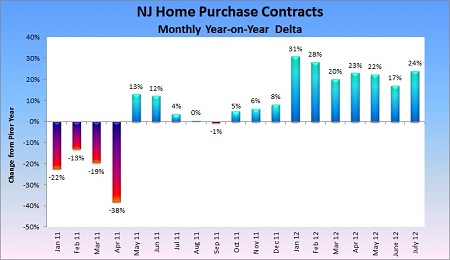The Millennial Generation, those born between the end of the ’70s and the start of the ’90s, have crossed into adulthood. They are taking up the mantels passed down from generation to generation.
But for varying reasons, they have been slower than others to enter the home-buying market. And if they don’t buy, Generation Xers can’t move up, and if they can’t move up, then Baby Boomers can’t downsize.
“First-time home buyers hold the key,” said Gary Large, president of the New Jersey Association of Realtors. “There’s no doubt about that, but households in the lower-age bracket are finding it’s more difficult for them to buy now.”
Megan O’Haus, 26, and Ron Redzia, 27, may be typical.
They met in high school and are planning an Oct. 12 wedding. They wanted nothing more than to return from their honeymoon in St. Lucia to their own home.
“We’ve been looking since February,” O’Haus said. “We’ve already been pre-approved. We just didn’t have any luck.”
The couple rents an apartment and was “as budget-conscience as possible,” O’Haus said. She’s a public relations account executive, and Redzia is an auto technician at a Porsche dealership.
They put bids on four homes. “One was our ideal home in West Caldwell,” she said. They offered the full asking price on each of them, but were outbid, even after countering with $15,000 more.
Then there was a dry spell as the three-year-long stagnant market turned around and inventory shrank. Their search continued until last week when they found a three-bedroom, one-bath ranch in Oakland. They hope to close a week after they return from St. Lucia.
…
“The people who are 25 to 34 now are not the same people who were 25 to 34 a decade earlier,” said Jeffrey Lubbell, executive director for the Center for Housing Policy in Washington. “Times have changed. For this generation, half of their working life has been during a period of greater economic uncertainty.”
But a nationwide study by the real estate firm ERA found a majority of millennials haven’t lost their optimism.
“Most young people who rent through us,” said Joe Boniakowski, of the E.A. Boniakowski Agency in Greenbrook, “who have a good education and a job, they ask to be kept on a list because they’re interested in buying a home eventually.”
The dream hasn’t changed, but tastes and the economy have.
…
Matt Francello and Erika Pavlecka are both 29 and work in the Nutley school system. He’s a gym teacher in the high school and the head freshman football coach. She’s a 6th grade teacher. They met in college, rent a one-bedroom apartment in Lyndhurst and plan to marry Nov. 9.
But they aren’t house-hunting.
“We made a decision that we’ll stay where we are,” Francello said. He pointed to the costs of owning a house. “Property taxes alone would equal what we pay in rent,” he said.
“I work hard. I teach, I coach, I have a cash job chaperoning parties, but it never seems enough,” he said.
For them, the dream of owning a home isn’t dead — it’s just deferred. “I’d like to think that (home ownership) is in our future,” he said, “but when we decide to do that, I want to be able to make a significant down payment.”
…
James Hughes, dean of the Edward J. Bloustein School of Public Policy at Rutgers University, said when the economy crashed, some millennials lost faith in what they had been taught growing up.
“Housing used to be viewed as a super piggy bank,” Hughes said. “The traditional mantra was that home prices only go up. Young people were told ‘get on that train as soon as you can.’ That’s history now in the minds of some.”
He notes other generational changes that have affected home-buying trends.
“We’ve seen an extended period of adolescence,” he said. “Over the past four or five years, we’ve seen more young people are living longer at home with their parents, or renting with a large number of roommates to keep costs down.”
Hughes said part of the reason is that, for recent college graduates, the job market isn’t very good.

